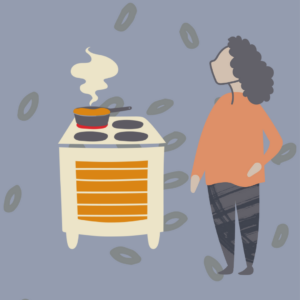
By Dr. Naomi Maynard, Feeding Liverpool’s Good Food Programme Director
This question “why don’t people just make soup?” gets asked again and again in conversations about how to support people on lower incomes so they can eat good food.
It may seem like a simple solution and eating healthily on a tight budget is certainly possible, but there are hurdles in the way that make this more of a challenge than may first appear to someone who hasn’t experienced this first-hand.
Sarah’s story*, shared more formally as part the House of Lords’ Hungry for Change: Fixing the Failures in Food Select Committee Report, and personalised for this blog, highlights why preparing healthy, nutritious meals, particularly for those on the lowest incomes, isn’t as simple as “just make soup”.
Sarah’s a part-time cleaner for the NHS and a mum to three kids ages two, seven, and thirteen. She’s used to buying ready meals for her family; they are easy to prepare (10 minutes in the oven whilst the littlest one runs around her feet), are usually enjoyed by all her children, and are often on deal at her local convenience store.
However, after worrying about how to support her children to eat a varied and healthy diet on her income, she was encouraged by a friendly charity worker to “just make vegetable soup”.
But would her children even like vegetable soup? This was a worry for Sarah, she couldn’t afford for the meal to get wasted.
Sarah didn’t have any recipe books to use, so after difficulties logging online – Sarah can’t afford fast WIFI in her house, and doesn’t have unlimited data on her phone – she managed to find a recipe.
She didn’t have all the ingredients already, and some of the stock and flavourings weren’t available in her local convenience store. This meant a bus trip to a larger store and £4.00 on the return fare with the toddler in tow.
If the ingredients had been sold in Sarah’s local shop, they are likely only to be available in small quantities and therefore decreasing the value for money. A cost of the ingredients of a new meal without a “middle class store cupboard” is estimated at £15.[1]
After reaching the larger store, Sarah had to resist her toddler’s cries “can we get the cheesy pizza! Look mum, ice-cream!” – what’s called Pester Power – and the shiny deals of quicker, simpler meals displayed throughout the store.
When home, Sarah realised she didn’t have all the equipment listed in the recipe to make the soup. She needed weighing scales, knives, a peeler, and a hob, and ideally a blender, although if she boiled the veg for long enough, she could do this with a fork. Sarah also needed the money for the extra gas; this was going to take longer than some of the meals she usually made.
This meant more purchases, which, whilst Sarah knew would pay off in the long run, when budgets are tight there isn’t always money to be able to buy investment items like these.
Following the new recipe itself was a little stressful and certainly time-consuming especially with the fear that if the soup goes wrong, or is unpopular with the rest of the family, or simply doesn’t taste good, her kids may want to eat something else. Meaning she’d have to pay for two meals along with the time, money, and energy spent on the soup having been wasted. If that happened, the remaining ingredients may also go to waste. There was also the worry that her hungry children or her teenager may not feel full having eaten only soup.
Separately, Sarah’s worries and difficulties are not insurmountable. Combined, however, they represent real barriers to accessing good food and a healthy diet. When there are so many easy, cheap, and reliable alternatives available, “just make soup” or similar suggestions can very quickly become an unappealing option.
[1] https://committees.parliament.uk/writtenevidence/175/html/
*Whilst Sarah is a fictional character used to personalise the case study written for the House of Lords Select Committee, her experiences echo those we have heard through our work with people with experience of poverty
